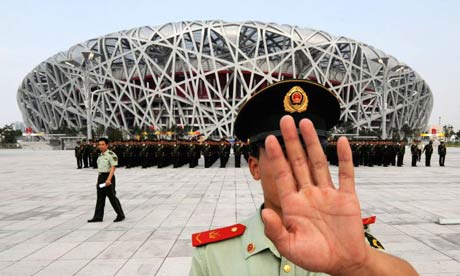‘Work and Study’ Programs Put Hundreds of Thousands of Children at Risk
Human Rights Watch, December 3, 2007-
(New York, December 3, 2007) – The Chinese government should abolish the use of income-generating child labor schemes in middle and junior high schools because of their chronic abuses, Human Rights Watch said today. Many programs interfere with children’s education, lack basic health and safety guarantees, and involve long hours and dangerous work.
“China claims that it is fighting child labor, and repeatedly cites its legal prohibition against the practice as proof,” said Sophie Richardson, Asia advocacy director at Human Rights Watch. “But the government actively violates its own prohibitions by running large programs through the school system that use child labor, lack sufficient health and safety guarantees, and exploit loopholes in domestic labor laws.”
Under “Work and Study” programs regulated by the Ministry of Education, schools in impoverished areas are encouraged to set up income-generating activities to make up for budgetary shortfalls. According to official statistical material from the Ministry of Education seen by Human Rights Watch, more than 400,000 middle and junior high schools, which are for children ages 12 to 16, nationwide are running agricultural and manufacturing schemes. In 2004, proceeds from Work and Study programs generated over 10 billion yuan (US$1.25 billion), the statistics show.
Chinese law prohibits the use of child of labor under age 16 but stipulates that children may be employed under special circumstances, such as in sports or in the arts, or if their “occupational training” and “educational labor” does not adversely affect their personal health and safety. Regulations that govern Work and Study programs in middle and junior high schools prohibit hazardous work and stress that “education must come first,” but fail to provide a clear definition of the acceptable kind, intensity, and overall time duration of this special category of work.
The majority of schools limit these schemes to seasonal agricultural work (such as growing and harvesting crops), improving school facilities, or producing small handicrafts over summer breaks, either independently or through contract with outside employers.
But overly vague Work and Study regulations and poor supervision have led to widespread abuse of the system by schools and employers alike. Children as young as 12 have been employed in heavy agricultural and hazardous construction work. Others have been dispatched to local factories for weeks or months of “summer employment.” Some schools have turned into full-fledged workshops to produce local handiwork or foodstuff while relegating teaching to a few hours a week.
In recent years, numerous cases of children working in abusive conditions under the guise of Work and Study programs have been documented, with problems ranging from long working hours, dangerous working conditions, low salaries, and a range of health and safety hazards.
In July 2007, more than 100 middle and junior high school children were found in a factory making cardboard boxes in Panyu district, near Guangzhou. They worked eight-hour days in different shifts, the first starting at 8 a.m. and the last finishing at 11 p.m. The children were housed in the factory’s dormitory and paid 2.4 yuan per hour (US$0.30).
In June 2007, 500 children from a middle school in the western province of Sichuan were discovered working 14-hour shifts in a factory in Dongguan, Guangdong Province. Their school had contracted them to the company for summer employment. The children complained of poor living conditions, including crowded dormitories and insufficient food, and an array of work-induced health problems. Children were fined for production mistakes.
And in August 2006, local media reported that local school authorities in Maoming Municipality, Guangdong province, had arranged for 200 schoolchildren from poor families to work over the summer in factories in the neighboring manufacturing centers of Dongguan and Shenzhen. The children were working 11-hour days, with no rest on the weekend. Many complained of health problems, such as flu-like syndromes, persistent headaches, and fevers. A 16-year-old girl reportedly died as a result of untreated encephalitis. She had been complaining of high fever for three days but was not allowed to rest.
Budgetary pressures at the local level may account for worsening practices, with local government often slashing education and health budgets when revenues decline. Chinese law mandates that the state provide all children with nine years of free and compulsory education, but in practice most schools, especially in poor areas, cannot function without collecting tuition fees. The Ministry of Education says the Work and Study system is designed to generate revenue that enables schools from poverty-stricken areas to operate, and to subsidize children from poor families who cannot afford school-related fees. Local education departments at the prefectural or district level routinely fix revenue targets that must be met by individual schools, even though doing so is banned by the central government. In recent years, increasing budgetary pressures on schools have contributed to their “out-contracting” of students to employers looking for a cheap and easily manipulated workforce.
Hard labor, low pay, and hazardous work conditions are more prevalent in poor and remote rural areas. Schools, often with the encouragement of local education authorities, have sent children from poor areas in Sichuan, Hunan, Anhui, Guangxi, Guizhou, and Shaanxi to factories in the coastal regions for “summer employment.”
In remote areas such as Yunnan, Gansu, and Xinjiang, local employers have hired children for heavy agricultural work during the harvests. In December 2006, the Chinese media reported “severe violations” of Work and Study regulations in Minqin county, near Wuwei municipality (Gansu Province), including hazardous work conditions, unsafe transportation, and long working hours. In one incident, a middle school pupil died after falling from the truck used by the school to bring the children to the work fields. In April 2006, primary schoolchildren from Luoshan, Henan Province, were dispatched to a local tea farm to pick tea. A local teacher explained that it was the only way for the school to meet operating costs.
“Inequalities in China’s education system are out of control,” Richardson said. “Children from poor areas not only face vastly inferior resources, now they must also engage in heavy work to finance the schools they attend. The responsibility for adequately funding compulsory education should not fall on the shoulders of the children themselves.”
The State Council, China’s cabinet, has acknowledged the existence of severe defects in the Work and Study system in primary and middle schools. In 2006, prompted by an accident in which 131 children were poisoned after ingesting oil made from castor-oil seeds their school was making under contract from a local company, the central government issued a set of detailed instructions urging greater compliance with educational, health, and safety standards in Work and Study programs. “Labor that exceeds the bodily strength of children, involves toxic or dangerous material, or harms the development of the child are strictly prohibited,” the instructions said.
Other unauthorized practices detailed by the document include: the imposition of revenue targets by education departments on schools, and by schools on individual classes and schoolchildren; fining children who fall short of work quotas; children working overlong hours; and companies’ manipulation of the Work and Study label to employ underage workers.
Yet these new instructions have so-far failed to remove the potential for abuse. In 2006, authorities in the northwestern province of Xinjiang banned the employment of elementary and middle school children to pick cotton because it is excessively physically demanding. However, children were then redirected to other types of work that press reports describe as only marginally less taxing, such as picking beetroots, tomatoes, and other vegetables in state-run farms, and collecting recycling material. In summer 2007, factories in Guangdong, Jiangxi, and Fujian provinces were found using child labor under bogus Work and Study schemes, prompting domestic experts to urge the government to close this loophole in the legal prohibition of child labor.
Human Rights Watch said that little information about Work and Study schemes was publicly available, making it difficult to precisely assess the extent of unsafe forms of child labor in the education system. Most statistical information published by the government aggregates data for middle and junior high schools with figures for high school vocational training and student employment schemes for university students, which all fall under the same qingong jianxue (Work and Study) appellation. The results of a nationwide survey about middle and junior high school Work and Study programs conducted by the Ministry of Education from October 2006 to February 2007 have not been made public.
State censorship of the media has also contributed to the problem. The Ministry of Labor continues to classify statistics and details about child labor cases as “state secrets.” In September 2006, reporters from CCTV, China’s national TV network, documented the employment of children as young as 8 to harvest corn for a local employer. Children were shown carrying heavy loads and working in fields for the entire day. The broadcast sparked public outcry, but, rather than encouraging public debate of the problem, the story was instead removed from the CCTV’s website.
Human Rights Watch said the government should immediately stop programs that put children at risk, release all the information and data about these programs in view of reforming the labor laws, and publicly announce how it will phase out the system.
China is a party to the United Nation Convention on the Rights of the Child and the International Labor Organization (ILO) Convention 182, which prohibit work that is hazardous or interferes with a child’s education.
“China’s own laws and international obligations recognize that children shouldn’t be working,” said Richardson. “But the government allows dangerous work by underage children if their schools organize it. This really raises doubts about China’s commitment to eliminating child labor.”
– Original report from Human Rights Watch





